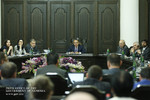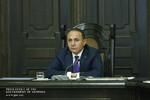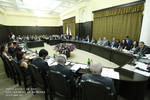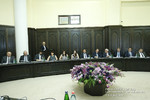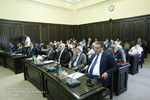Wednesday, 15 June 2016
Anticorruption Council Holds Regular Meeting
Prime Minister Hovik Abrahamyan chaired today a regular meeting of the Anticorruption Council, attended by political forces, civil society and international organizations. First, Minister of Justice Arpine Hovhannisyan and Armenian Lawyers Association NGO Chairman Karen Zadoyan presented the results of a joint working group operational within the framework of the institutional system combating corruption and the findings of a study covering the global expertise.
The group included representatives from both the Ministry of Justice and civil society organizations, including the representatives of civil society organizations (CSO) anticorruption coalition. The Council discussed in detail the international experience represented in the report in an effort to create anticorruption agencies and a number of fundamental principles of enshrined in international documents aimed at ensuring the independence and effectiveness of anticorruption authorities.
The task force was said to have recommended two options for Armenia: the establishment of an independent and universal anticorruption agency, which will include three components: investigation, prevention and education, or an independent anticorruption body, which will have a preventive and educational functions, as well as a specialized investigative body. Given our country’s possibilities and the need for resource mobilization, the two entities will use the capacity of the Special Investigation Service and the Ethics Committee.
Arpine Hovhannisyan noted that the two models shall provide all the necessary tools to advance the principle of comprehensive provision. In this connection, an exchange of opinions took place, during which the speakers came up with a number of comments and suggestions.
“We have to take into account that each model has its advantages and disadvantages, and listening to the questions, we can not yet make a final decision today. I instruct the Ministry of Justice to hold a thorough discussion on the proposed models, once again reveal the pros and cons and make a decision on the proposal within two months. No need to hurry, should there appear any conflicts with the law: we need to investigate the global expertise and involve international experts,” summing up the discussion, the Prime Minister said.
Then Karen Zadoyan reported on the issue of creating an institute for identifying the real owners in public procurement and the introduction of a ban on real owners of offshore zones in public procurement. He noted that the issue was raised in the course of business associations and business discussions with CSOs, as an urgent problem of corruption risks.
Presenting the results of the study, Karen Zadoyan noted that the main danger emanating from offshore is that many companies, whose owners are unknown as they are registered in offshore zones, win public procurement tenders in Armenia. He said the findings of the Control Chamber point to the existence of mostly non-resident or offshore companies registered in such zones in order to participate in the procurement, while the domestic legislation does not stipulate any obstacle, and organizations registered in offshore zones may participate in public procurement.
To enhance the level of transparency and increase accountability in procurement, it was recommended as an option for the government to disclose the real owners of companies willing to sign a contract with it, as well as to publicize relevant information free of charge on the latter. The speaker noted that the study of international experience on the application of this approach and the statistics show a net decrease in the level of corruption.
The Prime Minister generally accepted the proposed approach, noting that the issue is important and wide-ranging. The Head of Government commissioned the Minister of Justice to submit within two months a legislative package of to the Office of Government.
Then the floor was given to Investigative Journalists NGO reporter Sara Petrosyan, who introduced the findings of two studies referred to as "Ensuring legality in the process of alienation” and “Auctions held in local self-government bodies.”
She referred to the irregularities identified in the fields covered by the scope of the legislation, ensuring auctions transparency of the legislative requirement for the announcement contents, procedure auctions and the violation of legal consequences, indoor and classical auctions, the auction starting price, and other shortcomings in the organization of the auction process.
Presenting her proposals, Sara Petrosyan considered it important to improve the existing legislation in order to eliminate the contradictions and inconsistencies between laws and regulations, draft a model charter for auctions, mandatory for all communities, set up a specialized institution for holding auctions, effective management of community property and so on.
Noting that there are problems and gaps in the field, Hovik Abrahamyan instructed the Prime Minister's Control Service to present evidence and carry out spot checks. The Prime Minister stressed that in this area there is a need for legislative changes, and instructed the Ministry of Territorial Administration and Development and the State Committee on Immovable Property Cadastre by the Government, taking into account all the facts and omissions to present a package of legislative changes and government staff within two months, which once again be discussed with the participation of all interested parties and submitted to the National Assembly.
The Deputy Director of Transparency International Anticorruption Center (TIAC) Sona Ayvazyan introduced the findings of a study carried out as part of the Anticcorruption Index of Defense Systems 2015 global study regarding the risks available in Armenia’s defense system. As a conclusion of the study, it is proposed to increase the transparency and efficiency of the system, which is necessary for strengthening the resource of confidence between the public and the armed forces and the efficiency of budget spending.
A report was also delivered by Deputy Defense Minister Ara Nazaryan, who presented an action plan aimed at strengthening the process of building integrity and actions (good faith) in the framework of cooperation with the North Atlantic Treaty Organization (NATO) in the Ministry of Defense.
Summing up the exchange of views held on the matter, the Prime Minister stressed that the effective provision of security owes to the reduced risk of corruption, and this process must be continuous. The Premier noted that the study of TIAC can be useful for the Defense Ministry’s programs and initiatives aimed at curbing corruption risks within the Ministry.







